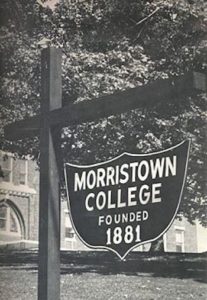
*This date in 1881 celebrates the founding of Morristown College, a Historically Black College and University (HBCU) located in Morristown, the seat of Hamblen County, Tennessee.
It was founded by the National Freedman's Aid Society of the Methodist Episcopal Church. Before the 20th-century American Civil Rights movement, the college held the distinction of being one of only two institutions in East Tennessee for Blacks, the other being Knoxville College, founded in 1875. By the fall of 1868, the freedmen of Jefferson County's Morristown district established a small grammar school, attracting students from the community and other areas of the state and the South.
Little is known about the early years of this school, though the building it housed was a modest church provided by the Presbyterians of Orange, New Jersey. Led by Mrs. Hanford, an Ithaca, New York native, the school was established to teach freedmen and free persons of color to read, write, and learn arithmetic, along with the obligatory instruction in Christian values.
The Reagan High School for Boys was a few blocks away, where Rev. Wilson taught a college preparatory course. Built as a meeting house in 1830 by a Baptist congregation, it had served as a slave mart, held secession discussions, and housed a hospital for Union and Confederate armies during the American Civil War. In November 1869, Mrs. Hanford was replaced by Almira H. Stearns, a native of Plainfield, Vermont. Stearns, who had lost her husband and a son to the Civil War, moved to the area with her daughter, Anna, to engage in missionary work. Relying on their Christian faith and the assistance of supporters, the harshness of the Reconstruction era and local resistance toward the school were taken in stride, as student growth and learning progressed steadily, reaching a wide variety of age groups. In 1880, the Holston Conference of the Methodist Episcopal Church voted to segregate the preachers, forming a separate conference for Blacks.
Discovering the lack of Black preachers, a handful of white men volunteered to join and assist. Among these volunteers was Rev. W.C. Graves, presiding elder of the Morristown District. Believing in a critical need for a school providing education for blacks beyond primary grades and preachers for black churches, Graves, along with the support of newly elected M.E. Church Bishop Henry W. Warren, decided the location held by Stearns and others was suitable. By 1881, Stearns and her pupils took possession of the church and school building, establishing Morristown Seminary.
In October of the same year, Dr. Judson S. Hill, a 27-year-old pastor and missionary from Trenton, New Jersey, was asked by the bishop of the Holston Conference to transform the school into a full-fledged seminary and normal school to provide teachers and ministers for East Tennessee's Black communities. With the assistance of Nannie McGinley, a faculty member, the school's path was set into motion.
The school was renamed Knoxville College-Morristown Campus in 1989 and closed in 1994. Notable alums included Lethia Flemming. The 52-acre campus was perched on a hill in Morristown and surrounded by five distinct neighborhoods. Seven of the college's nine buildings were on the National Register of Historic Places. After operations ceased, most college buildings fell into disrepair, succumbing to vandalism and neglect. The campus was demolished to make way for a city park that opened in 2019.